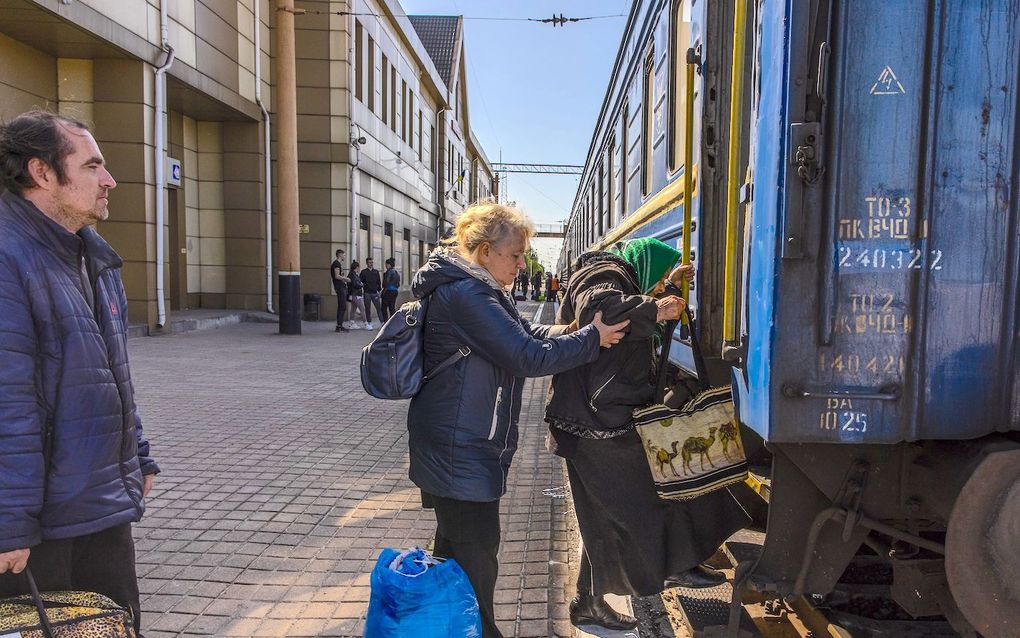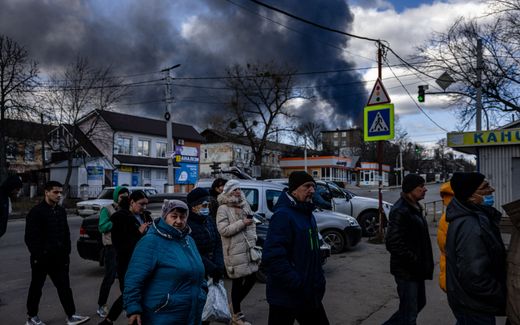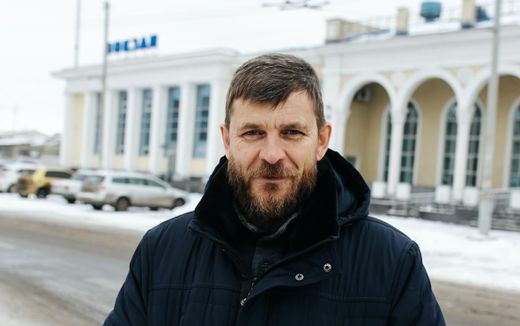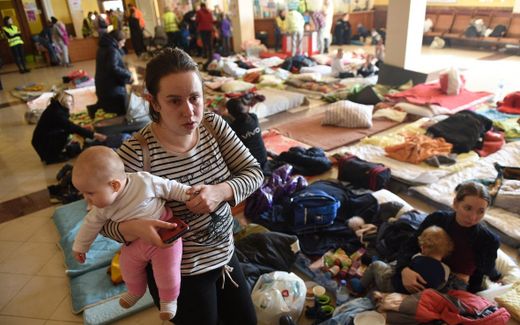"Do you start praying when a thief breaks into your house?"
10-05-2022
Eastern Europe
Floris Akkerman, RD

Ukrainians evacuating the town of Pokrovsk. Photo EPA, Roman Pilipey
Eastern Europe
Surrounded by the dangers of war, inhabitants of the Eastern Ukrainian city Pkrovsk left their houses en masse. Those who remained behind have good reasons to do so. "We will defend Pokrovsk", pastor Babenko says.
Rumbling sounds are heard in the distance from the cemetery of the East Ukrainian city Pokrovsk. The noises are produced by the artillery used by the Ukrainian and Russian troops at the front. But at the cemetery, mother and daughter Loedmila (50 and Anna Zaljoebovskaja (29) and Loedmila's mother Nina Volosetskaja (68) do not allow themselves to be distracted by the sounds.
They just fixed up the grave of Nina's husband, Konstantin. Together they removed the weeds and planted artificial flowers. The three women are sitting at a small green table with green benches next to the grave. They consume self-made red wine, cheese, meat and bread.
City surrounded by trenches
In the first half of April, most inhabitants left Pokrovsk. But the three women stayed. With the impending battle in the Donbas in Eastern Ukraine, the authorities called civilians to leave the city. Evacuation trains departed from the train station to the West of the country. Other people drove there by car. Especially families with children fled the town. According to the mayor, Roeslan Treboesjkin, about 30 per cent of the inhabitants remained behind. Before the war, the city counted 70,000 inhabitants.
Pokrovsk is the last stop before the eastern front. On the Eastern side of the city, the front lines can be found. The war has Donbas in its claws. Military columns of tanks and weapons rumble over the road from Dnipro to Pokrovsk. Soldiers can be seen sitting in half-open trucks. Their faces are tight and stressed. Trenches are found in the fields. Empty evacuation buses travel Eastwards to pick up civilians.
Three fronts surround three-quarters of Pokrovsk. The Russian troops are pushing about 180 kilometres from the city borders on the Northern side. In the South, they try to break through at a distance of 80 kilometres from the city, although they still have not been able to break through. There has been a front on the Eastern side for eight years already. It is located 50 kilometres from the city. On the other side, Pro-Russian separatists, backed by Moscow, declared the independence of the so-called People's Republic Donetsk in 2014. The fighting parties have entrenched themselves on both sides.
Store remains busy
At the cemetery, the rumbling sounds continue. Of course, we are afraid, Loedmila, Anna, and Nina say. Yet they proclaim confidently that they will stay in Pokrovsk, despite the threat of war. "What is the use of leaving", Loedmila thinks. "Kyiv, Dnipro, everywhere the danger looms. There are rocket attacks in all places. If it becomes really dangerous, we will dive into the bomb shelter."
The city is quiet. The streets are empty; traffic is barely seen. The sounds of birds are heard all day. Most stores have closed their doors. Houses, shops and pubs have blocked their windows. The university moved to the city of Loetsk in North-West Ukraine. Armed men have taken the grey building.
Only in the clothing store Larets, it is busy. Irina (38) and Katja (28) help one customer after the other in their search for sunglasses, a baseball cap and a belt. "Katja is my favourite colleague", Irina giggles.
Is it good for the business that all competitors left the city? "We have always had many customers", Irina says. "Our prices are low, and we give discounts. The store has never been closed", she continues. "We have to earn money because we need food. And we do not want to leave because we live here."
Standing your ground
More people stay for that same reason. They remain behind because this is their territory. And you do not leave your territory. They are born here, and their parents live here. Many take care of their parents, also in times of war.
In addition, there is another argument for staying behind: it is not easy to build a new life somewhere else. If you do, you have to find a job, and rents are much higher in Western Ukraine because the arrival of refugees increases the prices.
Several times a day, the air raid siren sounds in the empty streets of Pokrovsk or in the Anniversary Park where people play sports. Except for a few rocket hits, the city has remained relatively undamaged.
One of the times a rocket did hit something, an Iskander, a Russian rocket, damaged the centre of the city. However, no one died in the attack. The rocket remains are stored at the camp of the Territorial Troops of Pokrovsk. Civilians have joined this unit to protect the city.
One of them is pastor Denis Babenko (40). He walks around in camouflaged clothes and stands in one of the underground shelters built by the Territorial Defence Unit when the war started on February 24. Babenko does not even consider leaving. "We will defend Pokrovsk", he says confidently. "We will fight until the end. Me too."
Whether that contradicts the doctrine of his church? Should one not pray for peace? Definitely not, Babenko says without a doubt. "When a thief enters your home and rapes your wife, do you start praying? Surely you want him to stop, and you will intervene."
Related Articles





